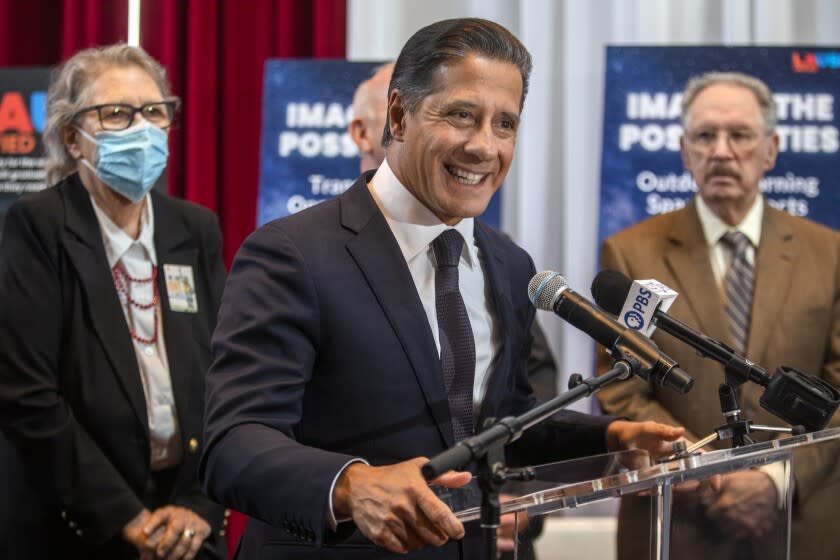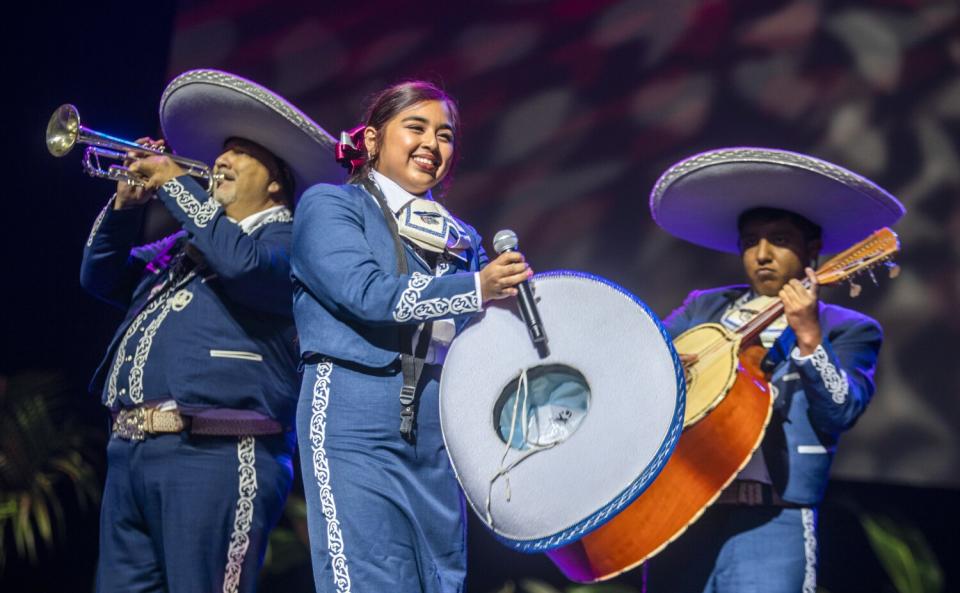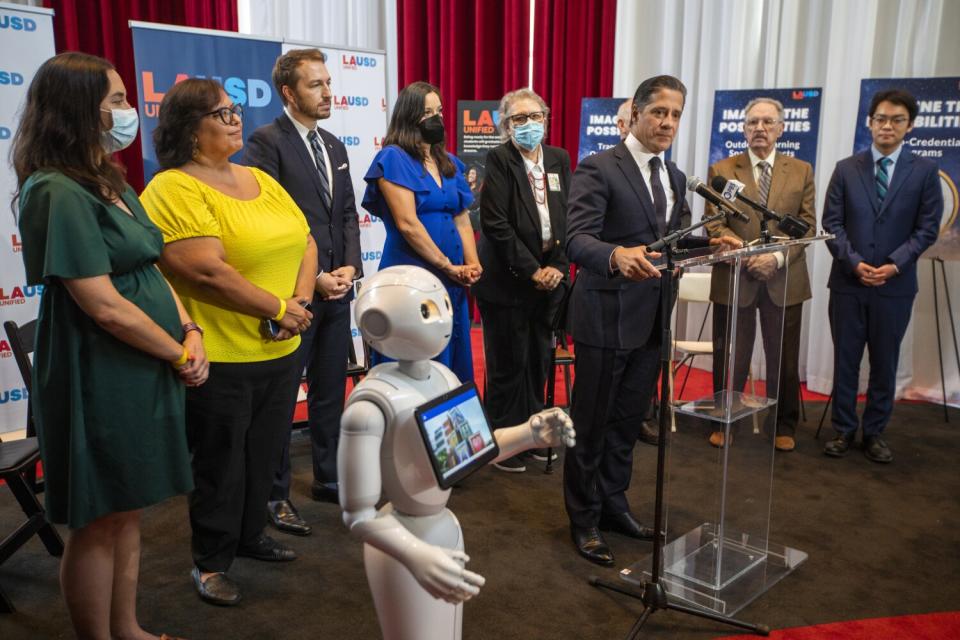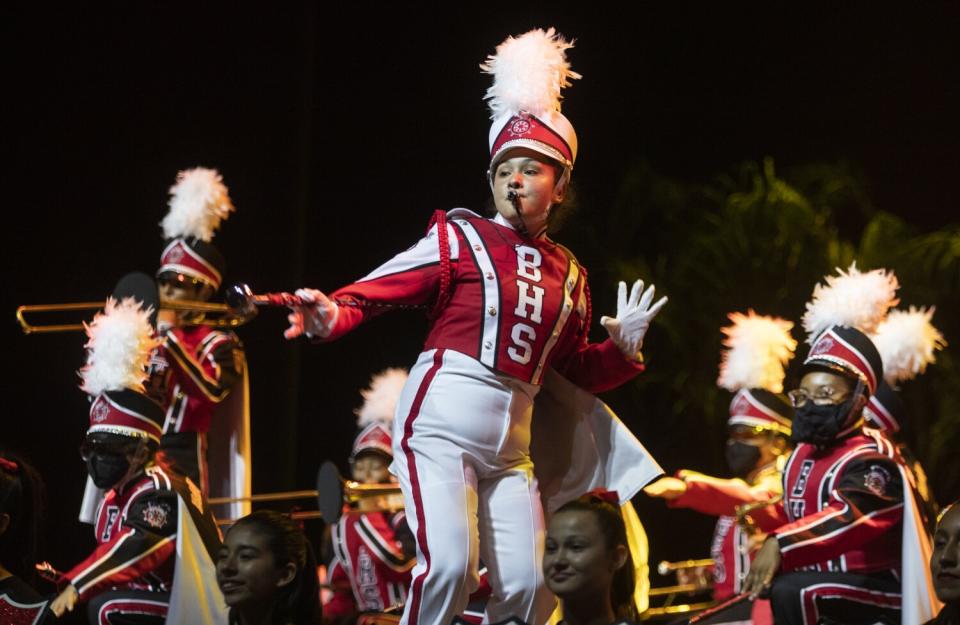LAUSD chief promises expanded early education, more bus seats and other 'swift' changes

- Oops!Something went wrong.Please try again later.
Los Angeles Supt. Alberto Carvalho, in his first back-to-school address, pledged Monday to bring rapid progress to the nation's second-largest school district, which has long struggled to make modest, consistent gains.
Carvalho made the promise to district administrators and other community leaders during what is widely viewed as a "state of the district" event and a preview of the academic year ahead — plans that will later serve as benchmarks to gauge the superintendent's own effectiveness.
“Most view reform at an institution like Los Angeles Unified as necessarily protracted,” Carvalho said in his prepared remarks to a packed Microsoft Theater in downtown L.A. “Community reform by nature does not have to be protracted or slow. It can be quick. And we will be making changes and reforming the way Los Angeles Unified conducts business in a swift and unapologetic manner."
In a speech that was intended to be both pep rally and aspirational, Carvalho pointed to his recently school board-approved strategic plan, calling it his guidepost, "laying out exactly how we will position Los Angeles Unified as the premier urban school district of choice."

The plan is organized under five "pillars" that together are supposed to represent key aspects that will lead to student success. The pillars are: academic excellence, joy and wellness, engagement and collaboration, operational effectiveness and investing in staff.
Under academic excellence, the superintendent noted that 360 new universal transitional kindergarten programs will open this fall, providing seats for up to 19,000 4-year-olds — and comes after plummeting pandemic enrollment among kindergarten-age children in Los Angeles and throughout California. Starting in the early stages of the pandemic-forced school closures, many parents opted to keep young children out of online remote instruction.
These programs are being opened across the state as part of new funding to boost early childhood education, although schools and districts have had challenges finding the necessary staff. For L.A. Unified, the effort is seen not only as an academic imperative but key to offsetting rapidly declining enrollment.
Another effort to boost enrollment and attendance involves opening empty seats on buses to provide more "local" transportation to area schools. Under official policy, busing is offered only to students living more than five miles from a school. Under a pilot program, 15 high schools will offer transportation for students living closer. In addition, all buses are now equipped with Wi-Fi.
Carvalho acknowledged recently that academic achievement is lagging as students are challenged by what experts call unfinished or incomplete learning from the pandemic years.
“It’s no secret that Los Angeles Unified has navigated difficult years, some of which resulted from the pandemic and some which existed long before,” Carvalho said. “But change is coming. Possibilities are on the horizon.”
The district has added four optional days to the school year and three optional teacher training days — a less aggressive extension of the school year than in many school systems. Like other districts, L.A. Unified intends to rely heavily on tutoring or special support to students during the regular school day.

With a week before school begins, Carvalho said there are fewer than 200 teaching vacancies remaining, a drop from 900 at the end of July, putting the district in better shape for opening day than in recent years. Open teaching positions will be filled — as long as needed — by staff members who have teaching credentials but have been working outside of the classroom. Officials said they also are moving aggressively to fill significant vacancies in the ranks of counselors, bus drivers and other non-teaching positions, an effort also taking place in many other school systems.
The superintendent also highlighted new career exploration opportunities for younger teens, including many in middle schools.
He said that 26 middle schools are installing labs that will allow students to explore numerous industry sectors through hands-on experiences.
In addition, the National Education Equity Lab is bringing college credit courses from top universities to high school classrooms. Initially, nine district schools and an estimated 225 students will participate.
The district also is introducing a "Greening Index" to examine the park needs of the community and the condition of each campus. A typical L.A. Unified campus has become a sea of asphalt — because it was viewed as easier and less costly to maintain than green space, especially during a time when the district was overcrowded and installing portable classrooms on that asphalt.
Over the last decade, the district has gradually been removing unneeded portable classrooms, but Carvalho wants to go further, siding with activists who see schoolyards as the equivalent of park space that can benefit children before and after school.

The district announced up to 20 projects to provide outdoor learning spaces with landscaping and greening. Projects will be identified using the Greening Index, officials said.
Still to be navigated is how greening efforts will square with water-conservation imperatives resulting from regional drought conditions.
If designed as intended, the new green space will enhance water conservation with an emphasis on drought-tolerant greenery and tree planting, while also allowing for the absorption of rainfall into aquifers, Mark Hovatter, the head of facilities, said in an interview after the speech.
The early education push includes a "Born to Learn” outreach campaign to support parents of newborn children with baby welcome packages and resources.
"People from my team will be just outside of the delivery room, ready to welcome new babies into the world with pacifiers and swaddling blankets," Carvahlo quipped. "Speaking of — how about we start a new merch line for babies. Someone check if Gap needs a new line. … Gap Baby by Los Angeles Unified."
The wry suggestion was illustrated with a slide of LAUSD-branded baby onesies and was typical of an address interspersed with laugh lines, pop culture asides and show-business references.
The remarks, which also included inspirational examples of student success, were generally well received, with some attendees calling it motivational, although others characterized the 70-minute talk as "too long."
"I thought it was really good," said Scarlett Ramirez Holguin, principal of Gates Street Early Education Center in Lincoln Heights, "especially because I heard early education mentioned quite a few times. It sounded like early ed is going to really be a part of it this year, which is one of the things that I haven't really heard in the past."
In the short term at least, L.A. Unified will have far more funding than in past years to accomplish an ambitious agenda, thanks to record state tax revenues and COVID-relief dollars.
"Now is the time to change, and there may not be another opportunity,” Carvalho said.
This story originally appeared in Los Angeles Times.

